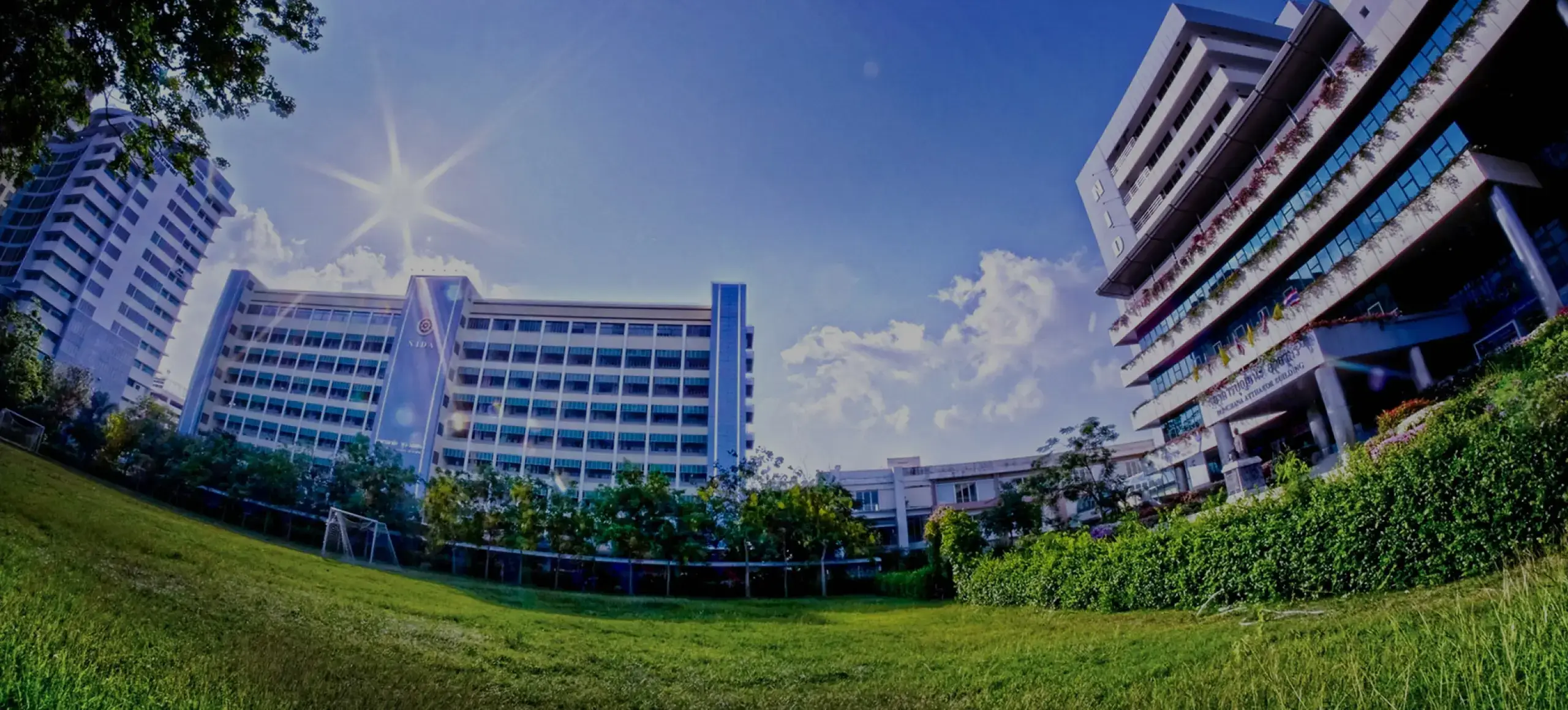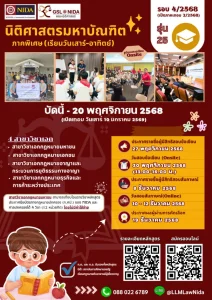Master of Laws Program
- The course is certified by and accredited by the Judicial Commission and the State Attorney Commission
- Regular Classes are held on Monday to Friday.
- The total cost of the course is approximately 120,000 baht.
- Currently open applications for the 24th batch.
- Executive Classes are held on Saturdays and Sundays.
- The total cost of the course is approximately 200,000 baht.
- Applications for the 25th batch are open until November 20, 2025.
About the Program
Title of Degree and Program
Master of Laws (LL.M.)
Major Subjects and Areas of Expertise
- Private Law
- Public Law
- International Business and Trade Law
- Criminal Law and Criminal Justice Administration
Upcoming Major Subjects
- International Law and ASEAN Community
- Natural Resources and Environmental Law
Program Philosophy
The program aims to produce law graduates who are highly competent, moral, and proficient in law. These graduates are capable of thinking, analyzing, determining the law, and pursuing a career in law to uphold social justice and to secure national interests.
Program Structure
| Subject Group | Program Track A2 | Program Track B |
| 1. Pre-Foundation courses | Non-credits | Non-credits |
| 2. Core courses | 9 credits | 9 credits |
| 3. Major courses | 15 credits | 15 credits |
| 4. Elective courses | 3 credits | 12 credits |
| 5. Independent study | – | 3 credits |
| 6. Dissertation | 12 credits | – |
| 7. Comprehensive examination | – | Written examination |
| Total | 39 credits | 39 credits |
Expected Learning Outcomes (ELO)
| ELO 1 | Apply the law under the rule of law for equitable and sustainable social development |
| ELO 2 | Understand and comparatively analyze legal philosophies, concepts, theories and guideline judgments of Thai and foreign courts |
| ELO 3 | Understand and precisely apply a body of legal knowledge in line with the social context according to the juristic method |
| ELO 4 | Integrate essential body of knowledge to advance legal skills for professionalism in jurisprudence in the field of development |
| ELO 5 | Strengthen leadership skills, effective communication, technology-related application, and lifelong learning |
Potential Professions of Law Graduates
- Personnel in the justice-related system such as police, prosecutors, judges
- Administrative case officials
- Legal officers
- Lawyers/legal counsels in the public and private sectors
- Attorneys
- Lecturers and academics in law and social sciences
- Politicians and political officials
- Lawyers/legal counsels in international organizations and NGOs
- Other freelance jobs
Course Management System
It is a bi-semester system. One academic year has two semesters, each lasting 15 weeks at the minimum. The program might cover a summer semester whose period and credits can be comparable to those in any regular semester.
Revised Program as of 2017 (B.E. 2560) (for students registering before Semester 1/2022) Title of Degree and Program
Title of Degree and Program
Master of Laws (LL.M.)
Major Subjects and Areas of Expertise
Master of Laws (LL.M.)
Upcoming Major Subjects
- International Law and ASEAN Community
- Criminal Law and Criminal Justice Administration
- Natural Resources and Environmental Law
Program Philosophy
- To produce lawyers including professionals in law-related careers with legal knowledge and expertise in domestic and international law to meet the societal needs and the directions of national development as well as to exceptionally respond to the labor market
- To produce graduates who are capable of studying, analyzing, synthesizing, and demonstrating academic and research excellence especially in legal issues with reference to national development
- To produce graduates who can apply their legal knowledge and expertise based on legal theory in analyzing as well as solving problems and difficulties that arise in the context of Thai society in order to recommend efficient means toward the correction, improvement and development of law
- To produce graduates with knowledge and expertise in particular areas of law as well as practical skills for legal implementation and interpretation with precision, morality, ethics, and good governance in order to uphold social justice and proclaim sustainable development perspectives
Program Structure
| Subject Group | Program Track A2 | Program Track B |
| 1. Pre-Foundation courses | Non-credits | Non-credits |
| 2. Core courses | 6 credits | 6 credits |
| 3. Major courses | 18 credits | 18 credits |
| 4. Elective courses | – | 9 credits |
| 5. Independent study | – | 3 credits |
| 6. Dissertation | 12 credits | – |
| 7. Comprehensive examination | – | Written examination |
| Total | 36 credits | 36 credits |
Expected Learning Outcomes (ELO)
| ELO 1 | Analyze legal philosophies, concepts, theories and guideline judgments of Thai and foreign courts |
| ELO 2 | Apply a body of legal knowledge with a precise understanding of the social context according to the juristic method |
| ELO 3 | Strengthen leadership skills, effective communication, technology-related application, and lifelong learning |
| ELO 4 | Integrate essential body of knowledge to advance legal skills for professionalism in jurisprudence in the field of development |
| ELO 5 | Apply the law under the rule of law for equitable and sustainable social development |
Potential Professions of Law Graduates
- Personnel in the justice-related system such as police, prosecutors, judges
- Administrative case officials
- Legal officers
- Lawyers/legal counsels in the public and private sectors
- Attorneys
- Lecturers and academics in law and social sciences
- Professionals in government agencies or establishments which require personnel with legal knowledge
- Politicians and political officials
- Lawyers/legal counsels in international organizations and NGOs
Course Management System
It is a bi-semester system. One academic year has two semesters, each lasting 15 weeks at the minimum. The program might cover a summer semester whose period and credits can be comparable to those in any regular semester.
Qualifications of Applicants
- Holding a bachelor's degree in law (Bachelor of Laws, LL.B.) or a certificate equivalent to a LL.B. from any government or private educational institution both domestically and internationally that is certified by the Office of the Civil Service Commission or the Office of the Higher Education Commission.
- Having some work experience of at least 1 year (up to the date of application).
- Being able to present a letter of reference or certification from a supervisor/employer certifying that the applicant’s position and period of work experience are in line with those written in the application form. Any applicant who is a self-employed lawyer or a freelancer must provide some legal documents or evidence of his/her occupation or profession, such as company certificate, juristic person certificate, attorney-at-law license to practice law or lawyer's license, etc.
- Being able to devote time to study as specified in the curriculum.
- Any applicant who does not submit his/her English test score on the date of admission test must present the English test score of NIDA TEAP, or TOEFL, or IELTS before applying for graduation.
Scholarship
- Educational Support Scholarships (Only for regular students)Regular)
- 1.1 Educational Promotion Scholarship Type 1:
- Recipients will be exempt from all tuition fees for the duration of their program and will receive personal expense support of 6,000 baht per month.
- Recipients must have a bachelor's degree with an academic record of not less than 3.00 and must enroll in Plan A (thesis).
- Recipients are required to work for Graduate School of Law as assigned, for 12 hours per week
- 1.2 Educational Promotion Scholarship Type 2:
- Recipients will be exempt from all tuition fees for the duration of their program
- Recipients must have a bachelor's degree with an academic record of not less than 3.00.
- Recipients are required to work for Graduate School of Law as assigned, for 6 hours per week.
- 1.3 Educational Promotion Scholarship Type 3:
- Recipients will receive a 50% exemption from tuition fees for the entire course duration.
- Recipients must have a bachelor's degree with an academic record of not less than 2.75.
- Recipients are required to work for Graduate School of Law as assigned, for 6 hours per week.
- 1.1 Educational Promotion Scholarship Type 1:
- Scholarship to Waive Tuition Fees:
- Aimed at assisting students with financial needs
- Provides an exemption from tuition fees for courses according to the curriculum (only for the semester during which the scholarship is awarded). The committee will consider applications twice a year before registration for Semesters 1 and 2.
- Recipients are required to work for Graduate School of Law as assigned, for 6 hours per week.
- Research Funding:
- The objective is to support thesis work. This funding is divided based on the source of funds into:
- 3.1 Research funding from the institution's budget
- 3.2 Research funding from the Government budget
Interested students can apply for scholarships by submitting your application along with supporting evidence to the Public Relations Department of Graduate School of Law, 5th Floor, Boonchana Atthakorn Building.







